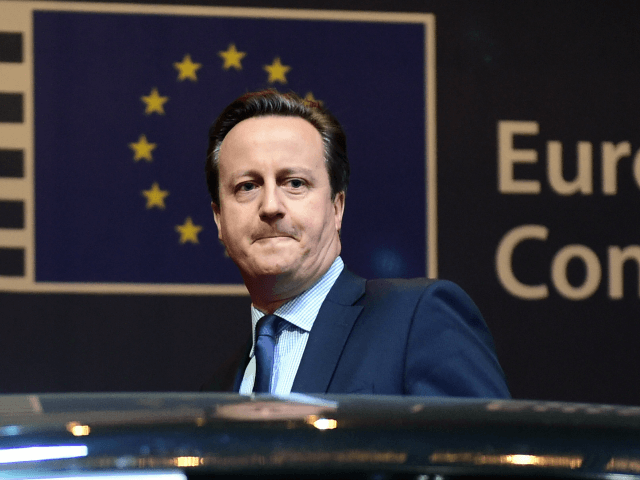One of Margaret Thatcher’s key supporters, economist Patrick Minford, has said government attempts to “terrify” households into voting for EU membership are “riddled with bias” and treat voters “like fools” .
Patrick Minford, the Professor of Applied Economics at Cardiff Business School, is famed for being an economist who stood up to the anti-Thatcher consensus of 364 other economists after they asserted there was “no basis in economic theory or supporting evidence” for her government’s budget in 1981.
As a member of the newly-launched ‘Economists for Brexit’, the former advisor to the Treasury between 1993 and 1996 has now come out fighting against the Treasury’s own economic analysis. He said it is “a load of complete nonsense” which fails to understand that leaving the European Union (EU) would be a “unique situation”. The Telegraph reports Professor Minford stating:
“Brexit is a unique policy change. Therefore assumptions about its impact cannot simply be read across. Joining the EU is not the reverse of a Brexit.
“When we joined in the 1970s it was because we stood to benefit from a situation of free tariffs — so joining increased free trade. Today, it’s quite different. We’re moving away from a situation of an effective customs union to a situation of free trade outside the EU.”
He told The Express:
“[The Treasury has] argued that when we joined the EU there was more trade and Foreign Direct Investment [FDI] and that means it was due to being in the EU, and we’d lose it if we left the EU.
“And that’s obviously nonsense because the situation today is quite different from the historical statistics that they have for the past.”
In reality, Professor Minford states that the opposite of what the Treasury predicts will happen will emerge. After Brexit he says the UK will “become more successful, become more productive, because our better industries will gain traction”.
In addition, he says that with consumer prices falling and competitivity rising “the economy will become better and the FDI will still come in”, going to different industries than those it currently targets.
Accusing the Treasury of trying to “blind us with science” he calls their analysis “kind of dishonest and condescending,” adding “it treats us like fools, it aims to terrify us.”
Harking back to previous battles he fought — not just the 1981 budget argument but also his opposition to Chancellor Nigel Lawson’s shadowing of the Deutschmark and the UK’s subsequent membership of the Exchange Rate Mechanism — he concluded:
“This is not the first time the UK establishment has opposed reforms that now we know greatly advanced the UK economy or have defended EU policies that proved disastrous.”
Establishment voices have criticised the analysis of Economists for Brexit. Jagjit Chadha, Professor of Economics at the University of Kent and director of the National Institute of Economic and Social Research, said academic literature suggests leaving the EU would cause economic damage.
However, The Guardian reports that Professor Minford is dismissive of such voices, saying:
“There is a tendency to favour the status quo. This is a disruptive change, free trade is disruptive.
“I think there is a natural bias among government bodies and international bodies to favour the status quo over disruption.
“Disruption means change and it could mean change to their own positions. It’s what you’d expect.”
The full force of the establishment was turned on Professor Minford during today’s Prime Minister’s Questions. Both Prime Minister David Cameron and Labour leader Jeremy Corbyn attacked his economic case for Brexit. Mr. Cameron said:
“I completely disagree with the economist Patrick Minford. He wants to see manufacturing industry in our country obliterated and that would be a disastrous step if we followed the advice that he gives.”
The Prime Minister’s comment was in response to commenta Professor Minford made in The Sun earlier this year, when he wrote:
We have excellent designers, highly skilled intellectuals and we specialise in ideas that are then sent to South America or parts of Asia to be made.
Over time, if we left the EU, it seems likely that we would mostly eliminate manufacturing, leaving mainly industries such as design, marketing and hi-tech. But this shouldn’t scare us.
Britain is good at putting on a suit and selling to other nations.
In reply to the Prime Minister’s recent comment Professor Minford told Wales Online:
“He is a crazy guy, isn’t he? What I’ve said is that it would hasten the decline of what you might call ‘bog standard making stuff’ that can be done in China. But it would leave behind it the hi-tech manufacturing which of course is [an] important part of British manufacturing.”
Professor Minford accused the Prime Minister and his colleagues of picking up “the crude soundbite that they then want to beat you over the head with.” When asked what he thought Margaret Thatcher would have made of such campaign tactics, he replied:
“Well, he’s a rabble rouser, isn’t he? The remain people are using this quote without any qualification… It’s the usual trick people do.”

COMMENTS
Please let us know if you're having issues with commenting.